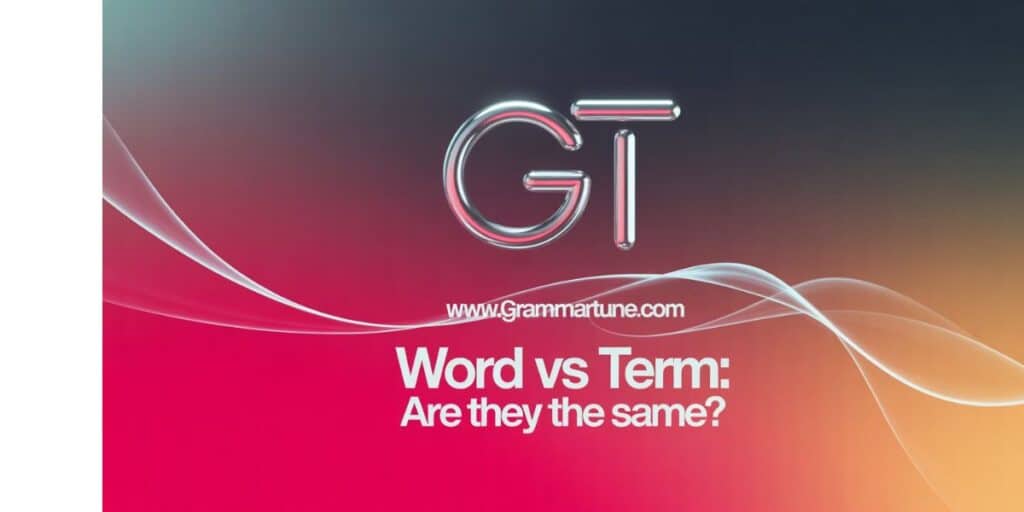The Word Vs Term conundrum usually leads people to the wrong path. In informal talks we interchangeably use a word and a term as if they were synonyms, Nevertheless, the situation changes as soon as academic or professional circles are involved.
The difference between a word and a term becomes suddenly very important, because each one has its own connotation and denotation. When you pick a general word while a specific term is needed—or vice versa, it can silently twist your message.
To remove the uncertainty, this article goes into the word definition, the term definition, their linguistic origins, and how both interact in casual talk versus the technical communication.
Why is There Confusion?
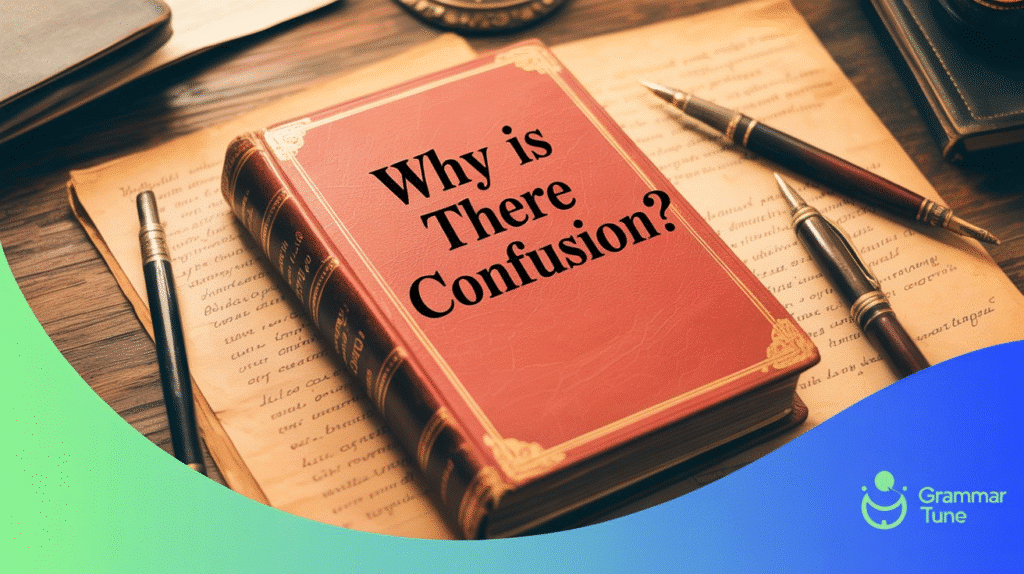
Many people blur the line between a word and a term because both act as units of meaning. In casual talk, their use often overlaps. For example, someone may say “inflation is a word,” when in reality, it is a term in economics with a precise definition.
In specialized fields, the Word vs Term difference becomes much clearer. A word can stand alone in any context, while a term is tied to a particular subject field. Without the right background or context, people may overlook the unique role a term plays in professional communication.
Must read: What is the Plural of ‘Stimulus’? Is it ‘Stimuluses’ or ‘Stimuli’ in English Grammar
Definition of “Word”
In the Word vs Term discussion, the definition of word is simple. A word is the smallest unit of language that carries meaning. It can be spoken, written, or signed, and it forms the foundation of vocabulary development.
Examples of words include: apple, run, blue. These fit naturally in general communication without needing any specialized knowledge. Their clarity in everyday usage highlights the difference between word and term, since words function independently while terms often require context.
Definition of “Term”
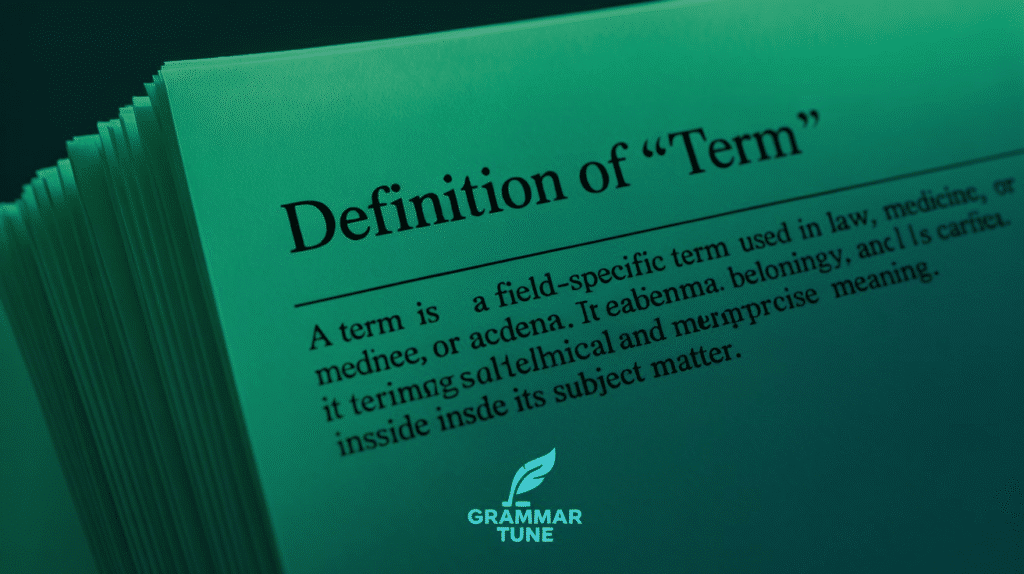
The definition of term is more specific. A term is a field-specific expression used in law, medicine, science, or academia. It belongs to technical terminology and carries precise meaning within its subject matter.
Examples of terms: mitosis (biology), photosynthesis (science), due diligence (law/business).
This shows the real difference between word and term—a word can stand alone, but a term usually needs professional context.
Similarities and Differences
Similarities
The similarities between word and term are easy to see. In the discussion of Word vs Term, both play an essential role in vocabulary development, appearing in speech, writing, and dialogue.
Each carries meaning and contributes to communication in language. Over time, both words and terms evolve as part of the natural evolution of language, adapting to cultural, social, and academic needs. This shows that while the difference between word and term matters in specialized fields, their shared role in language remains vital.
Differences
The Word vs Term difference lies mainly in their use. A word belongs to everyday language and works naturally in casual communication. In contrast, a term belongs to specialized communication and is closely tied to specific fields or jargon.
While a word can be used anywhere and still make sense, a term requires professional communication or subject knowledge to be understood correctly. This highlights the difference between word and term as everyday vocabulary versus technical terminology.
Examples of “Words”

In the Word vs Term debate, word examples are simple and widely used in general communication. Words like “chair,” “book,” or “happy” don’t require any subject field or background knowledge to be understood.
They express meaning directly in everyday language, making them essential building blocks of vocabulary and clear communication. This shows how the difference between word and term becomes visible in context.
Common Words vs Use in Sentences
| Common Word | Sentence Example |
| Apple | I ate an apple this morning. |
| Run | She likes to run every evening. |
| Blue | The sky is blue today. |
These common words vs technical terms highlight how words fit naturally in clear communication without needing specialized vocabulary.
Examples of “Terms”
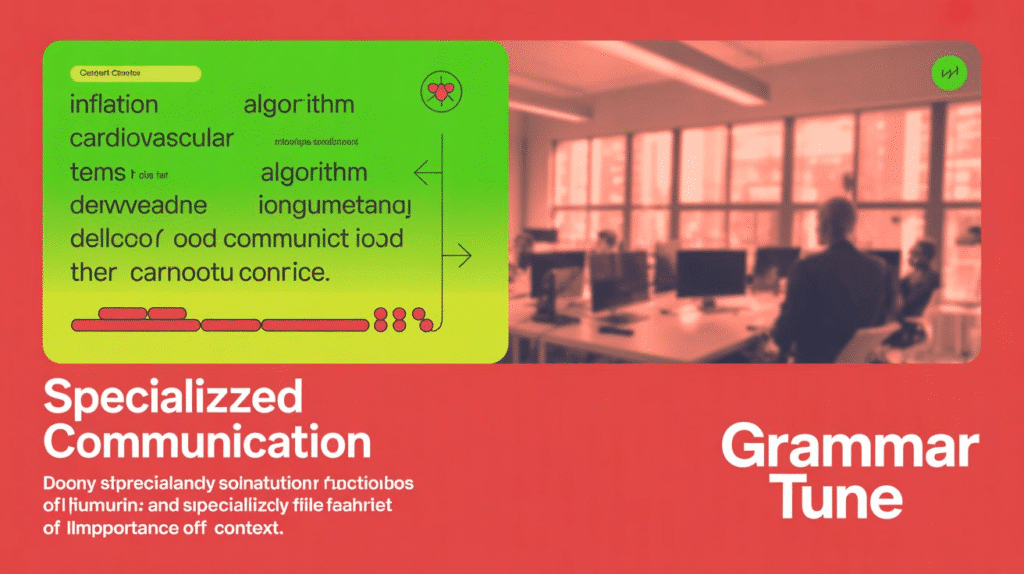
In the Word vs Term discussion, term examples clearly show how specialized communication works. For instance, “inflation” in economics, “cardiovascular” in medicine, and “algorithm” in computer science are all technical terms.
Unlike everyday words, these terms cannot be fully understood without the right context in language. Their meanings depend on the specific subject field where they are used, highlighting the difference between word and term in professional communication.
Terms and Their Fields
| Term | Field | Meaning |
| Inflation | Economics | Rise in prices of goods and services |
| Photosynthesis | Biology | Process by which plants make food |
| Due Diligence | Law/Business | Investigation before agreement |
Such field-specific terms are crucial in professional communication. Without context, their meaning in context is lost.
Origins of “Word” and “Term”
Origins of “Word”
In the Word vs Term comparison, the origins of the word trace back to Old English “word,” derived from Proto-Germanic roots. From the very beginning, it represented a basic unit of meaning or speech. Unlike many other linguistic elements, this concept has remained consistent throughout the centuries.
This shows that a word has always been linked to vocabulary, language expression, and communication skills across different cultures. Its enduring role highlights why words remain the foundation of human interaction and understanding, making the difference between word and term even clearer.
You will like: Backward or Backwards: Which is Correct?
Origins of “Term”
In the Word vs Term distinction, the origins of the term trace back to the Latin “terminus,” meaning boundary or limit. Over time, it evolved into a defined concept in language, especially in academic communication, where a term marks the boundary of meaning.
This is why a term became strongly linked to precision, specialized vocabulary, and professional usage. With the rise of terminology in science, law, and medicine, its role grew even stronger, ensuring clarity and accuracy in scholarly and professional fields. This evolution highlights the difference between word and term in everyday versus specialized contexts.
A Final Look at “Words and Terms”
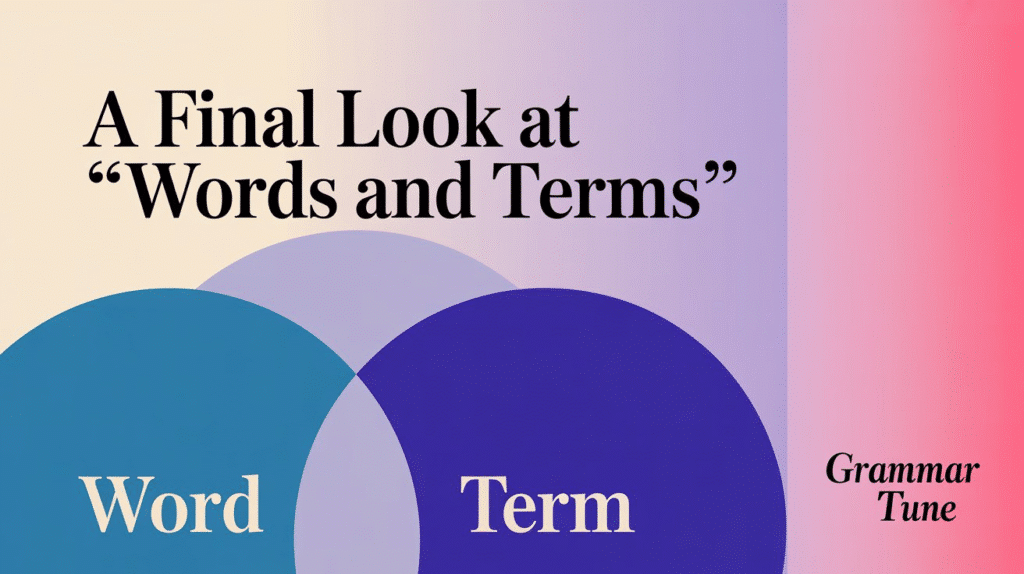
The journey of Word vs Term shows that they are not the same. Both share meaning, but their functions differ: one serves everyday communication, while the other belongs to specialized communication. The difference between word and term becomes clear once we examine the context in which they are used.
Research and case studies highlight this distinction. For example, a study by a US law school revealed that 80% of contract disputes were linked to unclear terms. This proves how much language clarity matters in professional communication, where terms must be precise to avoid misunderstandings.
Everyday Words vs Technical Terms
| Everyday Word | Technical Term | Context |
| Cell | Cell (Biology) | General vs Scientific meaning |
| Charge | Charge (Law) | Everyday vs Legal usage |
| Stress | Stress (Physics) | Emotion vs Scientific force |
This table shows how the same expression may shift in semantics, proving that context in language defines whether it is a word or a term.
You will like: Juxtaposition vs Paradox: What’s the Difference?
FAQs
What is the main difference between a word and a term?
A word is general, while a term is specific to a field.
Can every term be called a word?
Yes, but not every word is a term.
Why are terms important in academic language?
They give precision and avoid confusion in communication.
Can one word have many terms?
Yes, one word can act as a term in different fields.
How do words and terms affect communication skills?
They shape clarity, precision, and understanding in dialogue.
Final Thoughts
Understanding Word vs Term improves communication skills. It helps you see when a simple unit of language is enough and when a field-specific term is needed.
This awareness enhances semantics, prevents confusion, and builds clear communication in both personal and professional life.

Joulia, a seasoned wordsmith and grammar enthusiast, brings over a decade of blogging expertise to Grammar Tune. With a keen eye for linguistic precision and a passion for making complex grammar concepts accessible, he has helped thousands of readers enhance their writing skills. His engaging teaching style and practical approach to language learning have made him a trusted voice in the online grammar community.

